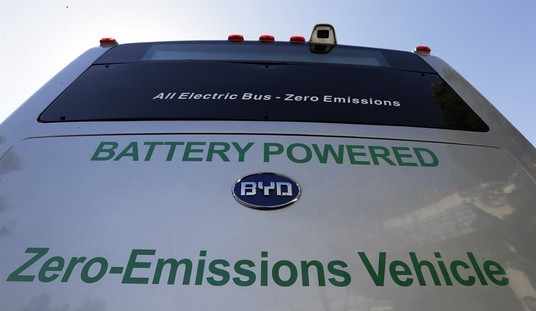We can safely expect the Obama administration to spin today’s jobs report as good news. After all, some net jobs got created in October, even if they fell 15,000 short of the expectation of 95,000. But as Clinton adviser and economist Robert Reich explained on MSNBC this morning, that’s actually going backwards in the context of population growth, and that makes this report decidedly not good news:
Reich actually uses the tougher floor of 125,000 net growth per month as a threshold for treading water, while others use figures that range from 100K-125K. So far the economy has produced an average of about 125,000 net jobs per month, which is a maintenance-only mode — and October fell off the pace.
Reich isn’t the only one giving bad reviews from Obama’s side of the aisle, either. The New York Times headlines the story, “Report Shows a Mere 80,000 Added in US in October,” and originally included this excerpt:
While job growth is certainly better than job losses, a gain of 80,000 jobs is barely worth celebrating. That was just about enough to keep up with population growth, so it did not significantly reduce the backlog of 14 million unemployed workers. As a result, the unemployment rate hardly budged, dropping to 9 percent from 9.1 percent in September. The rate has not fallen below 9 percent in seven months. In the year before the recession began in December 2007, the jobless rate averaged about half that, at 4.6 percent.
That changed to this in a later revision, leaving out the “barely worth celebrating”:
October’s job gains were just barely enough to keep up with population growth, and so did not significantly reduce the backlog of 14 million unemployed workers.
The unemployment rate was 9 percent in October, slightly lower than September’s 9.1 percent but about where it has been for the last seven months. By contrast, in the year before the recession began in December 2007, the jobless rate averaged about half that, at 4.6 percent.
Admittedly, that “barely worth celebrating” sounded like editorializing and probably should have come out of the report, but its original inclusion is indicative of the frustration building from Obamanomics. Even one of its key architects, Obama adviser and stimulus-package collaborator Jared Bernstein, says that the economy is “stuck in a slog,” and cautions about reading too much into the slight drop in the jobless rate:
We’re just very much stuck in a slog here. The private sector is expanding at a snail’s pace, while state and local governments continue to cut jobs. It’s a vicious cycle where weak employment growth is leading to weak wage* and income growth and that’s dampening consumption and GDP growth. And as long as consumers remain strapped, it’s hard for me to see why corporations sitting on trillions in cash reserves would invest here as opposed to expanding, emerging economies elsewhere. …
I suspect we’ll hear some people get all jiggy about the growth of employment in the Household survey of 277,000. But that’s well below the confidence interval of 400,000 (the sample size is a lot smaller in the Household survey; ergo, the wider confidence interval).
That doesn’t mean there’s no information in the headline numbers for months like October, where the change in both employment numbers is statistically insignificant (as is the change in the unemployment rate, by the way, from 9.1% to 9%; on the other hand, the increase in private sector payrolls of 125K is significant). If you average over a bunch of months, you’re essentially increasing the sample size and that gives a more reliable read (which confirms the slog I mentioned).
One reason why it’s hard to see corporations investing in the US rather than “expanding, emerging economies” elsewhere is because of the inability to project regulatory and tax costs over the next few years, thanks to Obama’s agenda of expanding ambiguous regulation on businesses across the board in the US. For tax relief, Obama proposes only gimmicky short-term policies like a temporary payroll-tax holiday, while promising higher tax rates in 2013 and beyond. Why anyone would invest in this climate is a question that Bernstein and Obama have yet to explain.
That may be why a new study by a Democratic Party pollster for the Democracy Corps — a James Carville organization — concludes that Democrats are losing the argument on the economy:
The Democrats are losing the battle of public perceptions over which party can best improve the economy, according to a new analysis by prominent Democratic pollster Stan Greenberg and other strategists.
Greenberg’s Study for Democracy Corps, a Democrat-oriented research organization, finds that, “Although voters do not trust either party right now to create jobs, the Republicans are more trusted on the economy, business and big business, and spending and deficits…Democrats are losing the economic argument because right now voters do not see how increased spending helps the economy and they fear increased debt will prevent the economy from growing.” …
The Democracy Corps says, “The mood on the economy is as bleak as we have seen it in recent years. By a two-to one ratio, voters are pessimistic about the future of the middle class.” And the least optimistic people are union members, white women (both married and unmarried), non-college educated whites, and white voters living in rural areas outside the South. All of these groups have been hit hard by the recession and they will be crucial in the 2012 election.
Their advice? Focus on “breaking the nexus of money and power in Washington and Wall Street.” I think the collapse of MF Global and the plight of its now-former CEO Jon Corzine makes that an even tougher argument for Democrats to win.








Join the conversation as a VIP Member